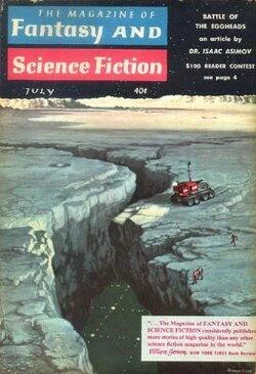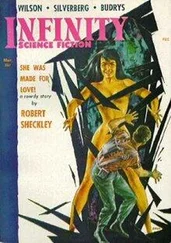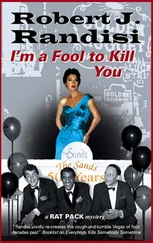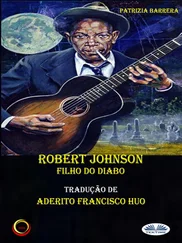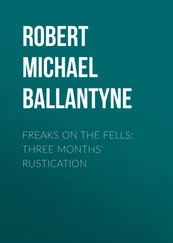Robert Young - To Fell a Tree
Здесь есть возможность читать онлайн «Robert Young - To Fell a Tree» весь текст электронной книги совершенно бесплатно (целиком полную версию без сокращений). В некоторых случаях можно слушать аудио, скачать через торрент в формате fb2 и присутствует краткое содержание. Год выпуска: 1959, Издательство: Mercury Press, Inc., Жанр: Фантастика и фэнтези, на английском языке. Описание произведения, (предисловие) а так же отзывы посетителей доступны на портале библиотеки ЛибКат.
- Название:To Fell a Tree
- Автор:
- Издательство:Mercury Press, Inc.
- Жанр:
- Год:1959
- ISBN:нет данных
- Рейтинг книги:5 / 5. Голосов: 1
-
Избранное:Добавить в избранное
- Отзывы:
-
Ваша оценка:
- 100
- 1
- 2
- 3
- 4
- 5
To Fell a Tree: краткое содержание, описание и аннотация
Предлагаем к чтению аннотацию, описание, краткое содержание или предисловие (зависит от того, что написал сам автор книги «To Fell a Tree»). Если вы не нашли необходимую информацию о книге — напишите в комментариях, мы постараемся отыскать её.
To Fell a Tree — читать онлайн бесплатно полную книгу (весь текст) целиком
Ниже представлен текст книги, разбитый по страницам. Система сохранения места последней прочитанной страницы, позволяет с удобством читать онлайн бесплатно книгу «To Fell a Tree», без необходимости каждый раз заново искать на чём Вы остановились. Поставьте закладку, и сможете в любой момент перейти на страницу, на которой закончили чтение.
Интервал:
Закладка:
It was the tree’s.
The foliage twinkled in the sun and the wind, and the trunk swayed lazily back and forth. And back and forth and back and forth.
Sap!
He had begun to think that the word would never assert itself, that its false synonym would pre-empt his mind forever.
Sap…
It didn’t have to be transparent. If the right pigments were present, it could be any color—any color under the sun. Purple. Green. Brown. Blue. Red—
Blood-red…
There was no reason to assume that, simply because a certain characteristic was present in ordinary trees, it necessarily had to be present in this one. There was no arboreal law that said a tree’s juice had to be colorless.
He began to feel better. Red sap, he thought. Wait’ll I tell Wright!
But he didn’t say a word about it to Wright when, a moment later, Wright contacted him.
“Almost ready?” Wright asked.
“Not—not quite. Doing a little reconnaissance.”
“Quite a favorite occupation of yours this morning.”
“In a way.”
“Well, since you’re going to keep the dryads all to yourself, I won’t try to muscle in. Too high for a middle-aged treeman like myself to be climbing, anyway. The reason I called was to tell you we’re knocking off for chow. I suggest you do the same.”
“Will do,” Strong said.
But he didn’t. He had tree-rations in his pocket, but he had no appetite to go with them. Instead, he sat quietly in the crotch and smoked another cigarette, then he descended the trunk to the saddle-rope crotch. Quite a bit of the sap got on his hands and he had to wipe it off on his handkerchief.
He retracted his spurs, intertwined his feet in the middle-rope and “skinned” down to the limbline-crotch. He paused there long enough to slip into his saddle, then he “burned” down to the end of the limbline, and attached the tongs to his belt. The first one hundred-footer was about twenty feet below him. He “burned” the rest of the way down to it, the limbline trailing behind him, and started walking out. The limb was quite large at its juncture with the trunk, but it tapered rapidly. When he judged he had covered two thirds of its length, he affixed the pointed tongs into the wood, adjusting them so that when the limbline tightened, they would get a firm bite on the limb.
The action had a calming effect, and when he tongued on his transmitter, he was his usual tree-self, and automatically lapsed into the mock-formal mode of address he and Wright sometimes used in their tree-to-ground exchanges:
“Ready when you are, Mr. Wright.”
There was a pause. Then: “You don’t believe in long noonings, do you, Mr. Strong?”
“Not when there’s a tree the size of this one staring me in the face.”
“I’ll turn on the winch. Sound off when the slack is out.”
“Will do, Mr. Wright.”
In its present position the limbline straggled back along the limb to the trunk, then up the trunk to the limbline-crotch. When the winch went into action, it rose into a sagging arc… a less pronounced arc… a straight line. The limb quivered, creaked—
“Hold it, Mr. Wright.”
He walked back to the trunk, feeding his saddle-slack through the tautline hitch. At the trunk, he put his weight into the seat and “burned” down till he was even with the underside of the limb. Then he leaned back in the saddle and drew his pistol-shaped cutter. He set the beam for ten feet and directed the muzzle at the bottom of the limb. He was about to squeeze the trigger when he caught a hint of curves and color on the periphery of his vision. He glanced out to where the limb’s leaf-laden branches brushed the noonday sky.
And saw the dryad.
“We’re waiting for the word, Mr. Strong.”
Strong swallowed. Sweat had run down from his forehead into his eyes. He wiped them on his shirtsleeve. He still saw the dryad.
She was half sitting, half reclining, on a bough too small to support her weight, and her wispy garment blended so flawlessly with her leafy surroundings that if it had not been for her pixy-face and golden limbs, and her gentle shock of yellow hair, he would have sworn he was not really seeing her at all; and even as it was, he almost would have sworn, because her face could have been a newly-opened flower, her limbs graceful patterns of golden wheat showing through the foliage, and her hair a handful of sunlight.
He wiped his eyes again. But she refused to disappear. He waved to her, feeling like a fool. She made no movement. He waved to her again, feeling even more like a fool. He tongued off his transmitter. “Get out of there!” he shouted. She paid no attention.
“What’s the holdup, Strong?” Wright’s impatience was evident both in his tone of voice and in his dropping of the mock-formal “Mr.”
Listen, Strong said to himself: You’ve climbed hundreds of trees and there wasn’t a single dryad in any of them. Not one. There’s no such thing as a dryad. There never was such a thing. There never will be. In this tree or any other tree. And there’s no more dryad out there on that limb than there’s champagne in your canteen!
He forced his eyes back to the underside of the limb towards which his cutter still pointed. He forced himself to squeeze the trigger. A slit appeared in the wood; he could almost feel pain. He tongued on his transmitter. “Up,” he said. The limbline twanged as it tightened; the limb sighed. He deepened the undercut. “Up,” he said again. This time the limb rose perceptibly. “Now keep a steady strain, Mr. Wright,” he said, and brought the invisible beam of the cutter slowly up through the wood tissue, freezing the molecular structure inch by inch. The limb rose up and back, separating from the stud. By the time he finished the cut, it was hanging parallel to the trunk and was ready to be lowered.
“Take her down, Mr. Wright!”
“Will do, Mr. Strong!”
He remained where he was while the limb passed, severing the larger subsidiary branches so that there would be less chance of its hanging up. When the final section came opposite him, he scrutinized it closely. But he saw no sign of a dryad.
He noticed that his hands were trembling again, and looking past them he saw something that made them tremble more: the cutter-beam had temporarily frozen the stub, but the sun was shining full upon it now, and blood was already beginning to ooze from the wound.
No, not blood. Sap. Red sap. My God, what was the matter with him? All the while he kept his eyes on the limbline so that he could notify Wright in case the limb became hung up. But the limb proved to be co-operative: it slipped smoothly through the lower branches and after a while, he heard Wright say, “She’s down, Mr. Strong. I’m raising the line again.” And then, in a shocked voice: “Did you cut yourself, Tom?”
“No,” Strong said. “That’s sap you’re looking at.”
“Sap! I’ll be damned!” Then: “Suhre says it looks pink to him. Blueskies, though, says it’s a deep crimson. What does it look like to you, Strong?”
“It looks like blood,” Strong said. He swung around to the other side of the trunk, out of sight of the stub, and waited for the end of the line to come within reach. While he waited, he gave the next limb down a good reconnaissance, but he saw no dryad lurking in any of its bowers. By the time he was set-up for the next cut, some of his confidence had returned and he had half forgotten about the “blood.”
And then the second limb began its downward journey, and he saw the new “blood” oozing from the new wound, and he was sick all over again. But not quite so sick this time: he was becoming inured.
He severed and sent four more limbs down in quick succession. He was lucky on all of them: not a single one became hung up. You needed luck when you delimbed a tree from the top down rather than from the bottom up and for that reason the top-to-bottom method was never used except in rare cases such as the present one, where the nearest houses were so close that the utmost care had to be taken in removing the lower, longer limbs. As the utmost care could not be taken if overhead growth interfered with their being drawn straight back against the trunk, the easier bottom-to-top method was out for Strong.
Читать дальшеИнтервал:
Закладка:
Похожие книги на «To Fell a Tree»
Представляем Вашему вниманию похожие книги на «To Fell a Tree» списком для выбора. Мы отобрали схожую по названию и смыслу литературу в надежде предоставить читателям больше вариантов отыскать новые, интересные, ещё непрочитанные произведения.
Обсуждение, отзывы о книге «To Fell a Tree» и просто собственные мнения читателей. Оставьте ваши комментарии, напишите, что Вы думаете о произведении, его смысле или главных героях. Укажите что конкретно понравилось, а что нет, и почему Вы так считаете.
